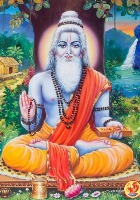Mahabharata, Book Xi - Gandhari's Lament For Duryodhyan Poem by Veda Vyasa
Mahabharata, Book Xi - Gandhari's Lament For Duryodhyan
Thus to Krishna, Queen Gandhari strove her woeful thoughts to tell,
When, alas, her wandering vision on her son Duryodhan fell,
Sudden anguish smote her bosom and her senses seemed to stray,
Like a tree by tempest shaken senseless on the earth she lay!
Once again she waked in sorrow, once again she cast her eye
Where her son in blood empurpled slept beneath the open sky,
And she clasped her dear Duryodhan, held him close unto her breast,
Sobs convulsive shook her bosom as the lifeless form she prest,
And her tears like rains of summer fell and washed his noble head,
Decked with garlands still untarnished, graced with nishkas bright and red!
''Mother! ' said my dear Duryodhan when he went unto the war,
'Wish me joy and wish me triumph as I mount the battle-car,'
'Son! ' I said to dear Duryodhan, 'Heaven avert a cruel fate,
Yato dharma stato jayah! Triumph doth on Virtue wait! '
But he set his heart on battle, by his valour wiped his sins,
Now he dwells in realms celestial which the faithful warrior wins,
And I weep not for Duryodhan, like a prince he fought and fell,
But my sorrow-stricken husband, who can his misfortunes tell!
Ay! my son was brave and princely, all resistless in the war,
Now he sleeps the sleep of warriors, sunk in gloom his glorious star,
Ay! My son 'mid crownéd monarchs held the first and foremost way,
Now he rests upon the red earth, quenched his bright effulgent ray,
Ay! my son the best of heroes, he hath won the warrior's sky,
Kshatras nobly conquer, Krishna, when in war they nobly die!
Hark the loathsome cry of jackals, how the wolves their vigils keep,
Maidens rich in song and beauty erst were wont to watch his sleep,
Hark the foul and blood-beaked vultures flap their wings upon the dead,
Maidens waved their feathery pankhas round Duryodhan's royal bed,
Peerless bowman! mighty monarch! nations still his hests obeyed,
As a lion slays a tiger, Bhima hath Duryodhan slayed!
Thirteen years o'er Kuru's empire proud Duryodhan held his sway,
Ruled Hastina's ancient city where fair Ganga's waters stray,
I have seen his regal splendour with these ancient eyes of mine,
Elephants and battle-chariots, steeds of war and herds of kine,
Kuru owns another master and Duryodhan's day is fled,
And I five to be a witness! Krishna, O that I were dead!
Mark Duryodhan's noble widow, mother proud of Lakshman bold,
Queenly in her youth and beauty, like an altar of bright gold,
Torn from husband's sweet embraces, from her son's entwining arms,
Doomed to life-long woe and anguish in her youth and in her charms,
Rend my hard and stony bosom crushed beneath this cruel pain,
Should Gandhari live to witness noble son and grandson slain?
Mark again Duryodhan's widow, how she hugs his gory head,
How with gentle hands and tender softly holds him on his bed,
How from dear departed husband turns she to her dearer son,
And the tear-drops of the mother choke the widow's bitter groan,
Like the fibre of the lotus tender-golden is her frame,
O my lotus! O my daughter! Bharat's pride and Kuru's fame!
If the truth resides in Vedas, brave Duryodhan dwells above,
Wherefore linger we in sadness severed from his cherished love,
If the truth resides in Sastra, dwells in sky my hero son,
Wherefore linger we in sorrow since their earthly task is done?
By Romesh C. Dutt (1899)
THE EPIC OF THE BHARATAS
BOOK XI: Funeral Rites]
This poem has not been translated into any other language yet.
I would like to translate this poem